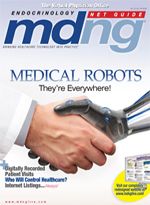Publication
Article
MDNG Endocrinology
3 Questions with... Nathan Zankman, MD, Verilogue Research Program Participant
Dr. Zankman discusses his involvement in a research project that requires participating physicians to digitally record patient visits for uploading to a national databank.
1 Why did you decide to participate in the research project with Verilogue?I received a fax in late September/ early October outlining the purpose of the company, and it seemed like a very fascinating idea; they were going to digitally record real-time offi ce visits with patients. The subject matter would be particular; very common problems... Instead of going to a focus group or going online, it’s done right in the offi ce with a digital recorder. The patients come in at random, and we pick them according to their condition or complaint and record the session. There is a short, online survey questionnaire concerning the patients—identifying the problem, how they were handled, and how they were managed medically—that’s uploaded along with the recordings. We fax the authorizations of the patients who’ve allowed us to record them. The idea is to have a national databank of doctor—patient communication, which I think is a great idea.
2 Do you listen to the recordings after the visits to help improve the quality of care you provide to these particular patients?
If I wanted to, I could listen to the recording before we send it off, but I don’t typically do this. In my mind’s eye, I have a pretty accurate memory of what happened during the visit, so [reviewing the recording] is really not the purpose. The purpose is to collect recordings for a survey for the entire country and then compare those to see what’s going on. I have done a few, but I don’t think I would as a rule listen to every conversation. It’s real-time recording. It may happen that it’s a complete physical examination, which takes more than half an hour, so I would be listening to maybe four or five hours of recording each day. For me, that’s not going to accomplish anything.
3 Do you think the research will end up benefiting all aspects of the healthcare industry, not just for pharmaceutical marketing?
It depends who’s listening at the other end. Obviously, it’s an anonymous collection of data. I think it will benefit [the whole industry] because it would include all healthcare companies. There are healthcare companies, for instance, who feel that their communications are prepared to distribute to doctors or healthcare personnel. It’s not just doctors, but nurses and other medical personnel. If someone walks into the office and has a problem, like asthma, usually if it’s a first case for a young child, you have outlined quite a bit of knowledge on the patient each time they come. You can reinforce your ideas by presenting written communications for the parents to read on the outside, and then that will enhance their knowledge. At the same time, you get feedback when they come back to the office if they have questions. I think it’s a two-way street for information.





